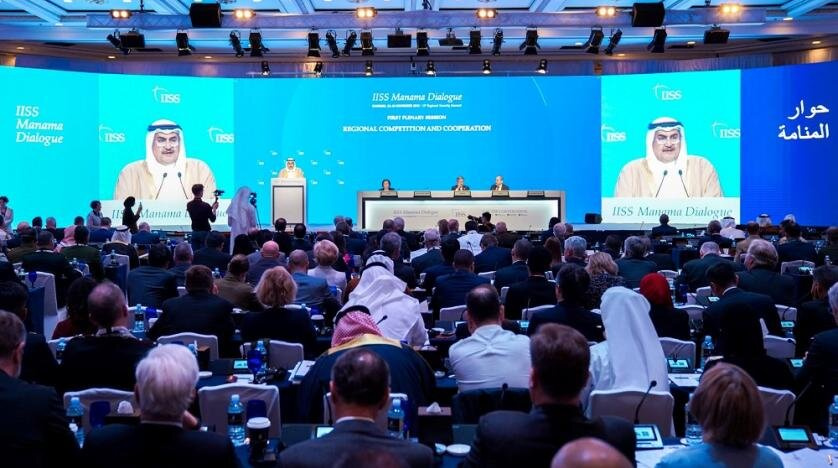What happened at the IISS Manama dialogue?

Bahrain has long been a place for holding meetings that follow the goals of the U.S. and the Zionist regime. The Al Khalifa family also is keenly serving the U.S. and the Israel.
Bahrain's Foreign Minister Khalid bin Ahmed al-Khalifa along with his allies in the Persian Gulf, who take a position against Iran and serve Tel Aviv, should know that Israel will not back them. At the time that political and military calculations are changing rapidly, Israel itself needs to be backed.
The time for Israeli and American orders is over and the coming days will be full of surprises. The Bahraini foreign minister and his regional allies should reconsider their calculations quickly.
The Manama dialogue began on Friday, November 22 and ended on Sunday, November 24. At the conference, the Arabs of the southern region of the Persian Gulf sought to increase pressure on Iran as they declared their readiness to resolve the disputes with Tehran through a diplomatic solution. It seems that this is a tactic that aims at getting more concessions from Iran in future meetings.
Minister of State for Foreign Affairs for the United Arab Emirates, Anwar Gargash, claimed that the issue of Iran’s ballistic missile should be dealt with through joint regional diplomacy, while Iranian officials have always insisted that the missile capacity of their country will not be negotiated with any person or country.
Speaking at a conference in Manama on Saturday, Gargash said that one of the reasons for instability in the region is what he called Iran’s Expansionist policies.
Saudi Minister of State Adel al-Jubeir claimed that Iran was involved in the attack on Aramco oil facilities, saying that the policy of satisfying Iran will not work out and the country should not be allowed to continue its foreign policy.
Bahrain's Foreign Minister Khalid bin Ahmed al-Khalifa was the third Arab official who claimed, in his speech at the Manama Conference, that Iran is intervening in Lebanese domestic affairs through Hezbullah.
The Bahraini foreign minister said, “Iran has created and supported Houthis. We need a comprehensive plan to stop Iran’s intervention in the region. We have been suffering from Iranian intervention for forty years, but have not wanted and will not to change Iran’s regime. We are distrustful of resuming cooperation with Iran”.
Also at the meeting, French Defense Minister Florence Parly criticized the U.S. for not interfering further in the regional affairs and not confronting Iran, noting that we would continue to negotiate with Iran.
Meanwhile, Iranian Foreign Ministry Spokesman Seyyed Abbas Mousavi denounced the baseless and worthless remarks and the bogus allegations made against Iran by certain participants in the Manama Dialogue in Bahrain and dismissed the accusations against Tehran.
Abdel Bari Atwan, a prominent Arab analyst, pointed to the Manama meeting and wrote in Raialyoum newspaper that it is well known that the meeting hosted by Bahrain, in addition to serving European and American masters, was, in fact, a part of propaganda through which the Al-Khalifa family is trying to show itself as a stable regime that is interested in the subjects of dialogue as well as regional and global security. Atwan added that the truth is that Bahrain does not care about the dialogue and has confronted its opponents, thus the dialogue has no place in such a regime.

